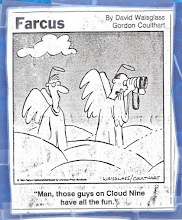Garrison Keillor did a great piece on Henry Watson Fowler on this morning's
Writer's Almanac, which is worth reposting:
"Today is the birthday of a man called a "lexicographical genius" by the London Times, Henry Watson Fowler, born in Tonbridge, England (1858), most famous as the author of A Dictionary of Modern English Usage, which he published in 1926.
His style guide — now generally referred to as "Fowler's Modern English Usage" or even just "Fowler's" — has sold more than a million copies. Shortly after it was first published, New Yorker magazine editor Harold Ross was compulsively consulting Fowler's guide to compensate for his own lack of formal education.
Poet T.S. Eliot prescribed that "every person who wishes to write ought to read [Fowler's guide] for a quarter of an hour every night before going to bed."
He and his brother did a translation of ancient Greek satirical writings for Oxford Press. Then they collaborated on The King's English (1906), also for Oxford University Press, which they called "a sort of English composition manual, from the negative point of view, for journalists & amateur writers."
At the beginning, it advises that writers pass up the temptation for showiness, and to be instead "direct, simple, brief, vigorous, and lucid."
The chapter on "Vocabulary" decrees: "Prefer the familiar word to the far-fetched. Prefer the concrete word to the abstract. Prefer the single word to the circumlocution. Prefer the short word to the long. Prefer the Saxon word to the Romantic."
It was a big success, and in many ways a precursor to Henry Fowler's 1926 guide, which he worked on alone since his brother died during World War I. . . The book is prescriptive, to be sure, 700 pages of instructions on what to do and what not to do in writing.
But his book actually is not as stilted or overrun with formal convention as one might imagine. In fact, Fowler is okay with prepositions coming at the ends of sentences or with using "and" to start a sentence; he's not a stickler about the position of adverbs in sentences; and he's famously amenable to the split infinitive — so long as all of these traditional transgressions are done for the sake of improving a sentence's clarity and meaning.
His bit on split infinitives has come to be one of the most famous passages in the book. He writes about it:
"The English-speaking world may be divided into (1) those who neither know nor care what a split infinitive is; (2) those who do not know, but care very much; (3) those who know & condemn; (4) those who know & approve; & (5) those who know and distinguish." He writes that while a split infinitive is "not desirable in itself" it is "preferable to either of two things, to real ambiguity, & to patent artificiality.""
For someone constantly plagued by split infinitives, I like this advice.


No comments:
Post a Comment